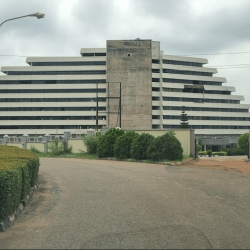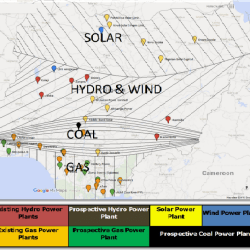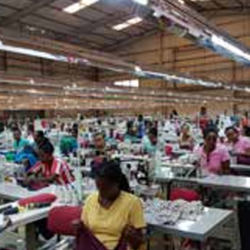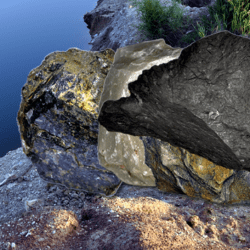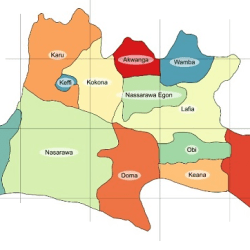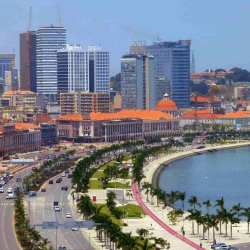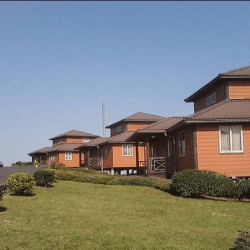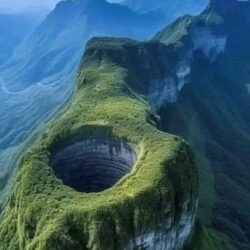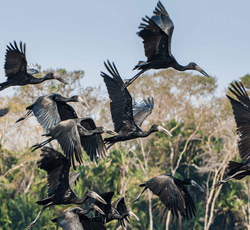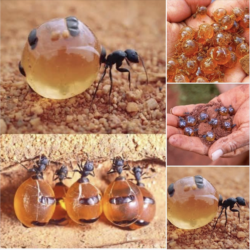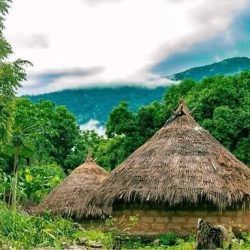Agriculture, Forestry and Fishing: Two main forms of agriculture are prominent in the state namely, food crop production and industrial crop production. The food crops produced include rice, yam, cassava, fruits and vegetables (mangoes, pawpaw, pineapples, banana, pepper and tomatoes). These crops are produced over the wide range of ecological zones within the state with the exception of the mangrove swamp and the coastal sand areas.

The industrial crops include rubber, oil palm and palm kernel. Like food crops, the industrial crops are grown in all ecological zones with the exception of the mangrove swamp and the coastal sand areas. Rubber is the leading export crop in the state. The highest concentration of rubber is in Ethiope, Okpe and Ughelli, which together have 61,200 hectares. Other locations include Aniocha (8,400 hectares) and Ndokwa (8,800 hectares).
Annual yield per hectare averages about 180 kilo grams dry rubber on peasant farms rising to approximately 370 kilograms on plantations. Oil palm is the next leading export crop. The highest concentration of oil palm occurs in Ethiope, Isoko, Ughelli, Ndokwa, Burutu and Bomadi LGAs. There are only a few oil palm plantations.
The yield per hectare of plantation is about four times as much as the yield from wild oil palm trees, which produce the bulk of palm oil, traded in the state. Among some of the programmes introduced to improve agricultural resource productivity of the state is the Tree Crop Unit. This programme is designed to aid small holder farmers to plant high yielding oil palm and rubber seedlings, with a view to raising their production.
The oil palm project is being implemented in two large nurseries located at Ejeme Uno in Aniocha South Local Government Area and Mosogar in Ethiope North Local Government Area. Thirty thousand sprouted palm seeds established in the two nurseries in the State are being maintained.
The rubber project is currently being implemented in Abraka and Mutu nurseries. The forestry resources of Delta State consist of timber, leaves (for wrapping kola nut), ropes and wild life. The forest contains over 500 species of timber, which attain 0.6 metres in girth at the breast height. Only eighty species are currently being harvested. Also, 80 per cent of the timbers are from forest reserves white 20 per cent are from outside forest reserves.
The estimated total area of the forest reserve is 74,910 hectares distributed in various locations in the state as indicated in Table 10.2. Since the southwest and south eastern parts of the state are predominately riverine, the occupation of the inhabitants is fishing.
The methods of catching vary from the traditional to modern, but the majority of the fishermen use gill nets. In an effort to reduce the side ratio between fish demand and supply, the following five programmes are being executed in the state:
Fisheries Extension and Assistance to Fishermen: The programme is aimed at the dissemination of information for the improvement of fisheries production. So far, 5,000 people in registered fisheries cooperatives in the state are benefiting from the scheme.
Fish Farming (Aquaculture): The aquaculture scheme is out to boost fishery production. So far, there are over eighty fishponds throughout the state. The government also maintains its own fish farms located at Agbor and Deghele to demonstrate the utility of fish farms.
Coastal Fisheries: The coastal fisheries agenda is designed to provide landing and other shore base facilities for production, handling and storage of fish caught along the state’s coastal waters.
ECOWAS Fund Loan For Accelerated Fish Production: The ECOWAS project is aimed at providing credit to fishermen for the financing of fishing inputs to 350 fishing units or fishing families. Finally, there is the Fisheries Regulation designed at sanitizing fisheries exploitation in the state, with a view towards conservation and use of approved fishing methods tor harvesting.
Mineral Resources: Delta State is rich in minerals. The Cretaceous Tertiary and Quaternary sediments, which underlay the delta structural basin, are favorable to the formation of crude oil accumulation. With the exception of the Northeast, other parts of the state abound in crude oil resources and natural gas.
Non metallic (industrial) minerals in the state consist of petroleum (crude oil), natural gas, lignite, silica sand and clay. Crude oil occurs in all the local government areas, except in the northeast of the State. The offshore locations are around Escravos and Forcados. Delta State produces about 29.98 per cent of the total oil production in Nigeria. Natural gas occurs in association with crude oil.
Estimated reserves amount to 800 million cubic metres. Of the total gas production of about 2,000 million cubic metres a month, only 12 million cubic metres are used as fuel and 11 million cubic metres are sold.’ The balance is flared. Delta State is at present producing a large proportion of the Nigerian natural gas. Although lignite occurs in large commercial quantities, its exploitation is yet to commence.
Very large deposits of silica sand occur in different litho logical formations and along the beds of rivers and streams in the state. They are used in the manufacture of various kinds of glass silica, which is the most important raw material for glass production. Finally, the Tertiary and Quaternary formations contain some layers of clay. These are particularly in abundance in Ughelli where stream clays are used for moulding in the glass factory.
Energy Resources: The energy supply in the State is derived from local thermal power stations. The thermal power station using oil and gas is located at Ughelli. It has an installed capacity of 276 megawatts, while the Ogorode hydroelectric power station, located at Sapele, has an installed capacity of 1,020 megawatts.
Water Resources: The water resources of Delta State include both surface and underground water. The surface water has a large area cover age. For instance, about thirty five per cent of the 16,842 sq. km. land of Delta is riverine.
Outside the riverine area, there is a high density of streams, ponds and lakes as well as a large body of ocean water, while the underground water is related to the underlying sedimentary rock formation. In many places, the underground water is so close to the surface in the southern areas that swampy conditions prevail.
Local Sourcing of Raw Materials: The natural resource potentials of Delta State yield wide ranging agricultural and industrial mineral products, from which raw materials can be sourced locally for the establishment of industries.
For instance, agricultural raw materials for agro allied industries include: maize, yam, cassava, fruits, vegetables, rubber, oil palm, palm kernel, timber, rope, leaves, et cetera. Raw materials for heavy, medium and light industries include steel billet, carbon black polypropylene, petroleum, natural gas, bitumen, lignite, silica sand and clay.
INVESTMENT OPPORTUNITIES
Economic Climate: Government’s efforts to create a conducive investment climate in the state include the granting of loans to willing entrepreneurs (i.e. local investors) to establish small and medium industries. A package of incentives for foreign investors is also available. These include capital allowance, tax holiday, relief and tariff protection.
Industrial Potentialities: A wide array of raw materials for agriculture and mineral based industries exist in the state, offering considerable investment opportunities. The raw materials from agriculture include oil palm, rubber, cassava, maize, fruits and vegetable. The possible areas for investments that will rely on agricultural raw materials include:
(a) Palm oil: Production of fatty oil used in paint and soap manufacture; production of palm wine for export trade to European market; and distilling of gin from raffia and oil palm wine.
(b) Rubber: Production of such items as belts, pipes, mats, auto accessories, shoe heels and soles, seal washers and bungs.
(c) Cassava: Production of industrial starch.
(d) Maize: Establishment of feed mills.
(e) Fruits and Vegetables: Processing for fruit juice and tomato puree.
(f) Fish: In fishing industries, opportunities exist for establishment of textile and equipment industry, manufacturing of fishing nets, boat building and canning industries.
(g) Timber: Projects for investment using timber include: the production of chip board or particle board, toilet rolls and corrugated boards for packaging, small toys, tooth picks, pegs, spoons, ice cream sticks and straw matting for packing. It also includes the production of pre-fabricated housing units.
Products from mineral based industries also provide wide opportunities for investment. The existing mineral based industries in Delta State are: Bendel Glass Factory (Ughelli), Delta Glass Company (Ughelli), Oil Refinery (Warri), Petro chemical Plant (Ekpan) and Delta Steel Company (Aladja). The products are glasses, carbon black, polypropylene, gas and steel billets respectively.
Glass: Glass bottles for beverages and brewery industries;
Paraldehyde Resin: Used in the plywood industries;
Steel billets: The linkage industries that can attract investments are foundry and die casting; prefabrication industries for the supply of spare parts required in auto mobile industries, rolling mills and flat mills. Oil Refining: Investment opportunities contingent upon refining and ancillary activities, include establishment of industries for the following industrial and food grade solvents: insecticides; cosmetics mineral oil, petroleum jelly, greases, bituminous based water/damp proof building materials such as floor tiles, rubber products, tarpaulins, etc.; Asphalt storage, packaging and blending plants to handle products for export and local use.
Carbon black and Polypropylene from petrochemical industries at Ekpan: The carbon black would be required for the establishment of industries for the manufacture of tyres, rubber products, pigment printing inks, etc.
The industries that require the use of polypropylene include industries for the production of injection moulding, blow moulding, fibres extrusion, shipping sacks, prayer mats, carpet underlay and cloth wrap.
Gas Industry: Opportunities exist for the establishment of industries for the extraction of solvents for both domestic and export markets and the manufacture of fertilizer. For the Liquefied Natural Gas (LNG), opportunities exist for pipe laying, pipe coating, inspection and numerous processes related activities as well as maritime operations.
Oil exploration activities: Opportunities exist for surveying, such as geodetic control establishment and sea bottom survey: civil works covering preparation of drilling location; seismic data acquisition and interpretation; geological and geochemical studies.
In drilling operations, exploration companies depend on the services of oil field contractors for the supply of drilling and work over rigs, field transportation and equipment for haulage and rig movements; general and specialized services such as casing running, segmentation, welding, diving and catering; provision of mud and other chemicals.
In crude oil transportation and storage, investment opportunities exist for the construction and maintenance of crude oil storage tanks and pipelines. In exploration and production, NNPC constantly considers requests from investors interested in the acquisition of acreages for hydrocarbon exploration, and the sub sequent development and operation of such fields.
FUTURE PROSPECTS
The abundance of natural resources in Delta State has great prospects for the industrial development of the state in future. Apart from the immense investment opportunities offered in the upstream and downstream segments of the activities in the oil and gas industry as indicated earlier, it is hoped that the currently under tapped natural gas will be fully tapped in future by the establishment of the Liquefied Natural Gas Project (LNG), similar to the NLNG in Bonny, Rivers State. Presently, over 1,300 million cubic metres of natural gas is being flared daily in Delta State.
Other ancillary industry to gas that will develop in Delta State include fertilizer manufacturing companies. It is also hoped that when the iron and steel industry becomes fully operational, the Delta Steel Company, Aladja, will influence development of link age industries, and that the after effect of the industrial development in the oil, gas and steel industries will enhance the financial base of the state government and make it possible for government to move positively to develop other arms of the economy, such as agriculture, education, health and transportation.
Reference: nigerdeltabudget.org/overview-of-delta/

